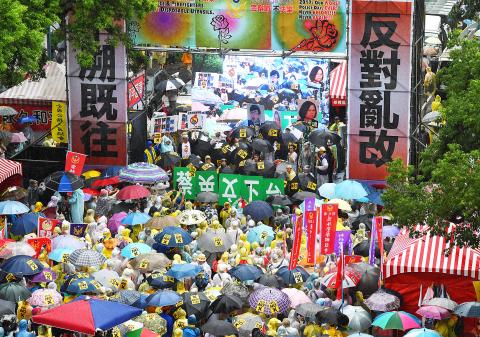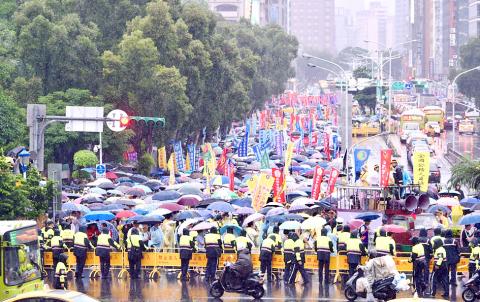Thousands of pensioners yesterday marched on the Legislative Yuan in Taipei to protest proposed pension cuts as an extraordinary legislative session on reform began.
A steady downpour failed to deter hordes of retired public-school teachers, civil servants and military personnel from packing Jinan Road and portions of neighboring side streets for several hours, maintaining a steady staccato of whistle-blowing and chants for President Tsai Ing-wen (蔡英文) to step down.
“We have to let the government know that even the rain cannot extinguish our anger,” said retired lieutenant general Wu Sz-huai (吳斯懷), one of the spokesmen for a small cohort of retired military personnel who have camped outside the Legislative Yuan for months.

Photo: CNA
Turnout estimates by protest leaders ranged from 15,000 to 30,000, with parts of Zhongxiao E Road and Zhongshan S Road blocked off as the protesters marched from the Legislative Yuan to the National Police Agency, the Executive Yuan and the Presidential Office Building, singing Martial Law-era tunes, such as Unity is Strength and the Central Police University anthem.
“The government has to keep its word, not apply reforms retroactively and not make a mess of reform,” Keng Chi-wen (耿繼文), a former director of the National Police Agency Internal Affairs Office, said from a loudspeaker truck outside the agency building.
Protesters placed flowers on the barricades or fences, with Taiwan Police and Firefighters Alliance head Chen Ho-liang (陳合良) delivering a bouquet to the assembled police officers.

Photo: Peter Lo, Taipei Times
The crowd had rapidly thinned to several hundred after the protesters made their way to Ketagalan Boulevard and back to the Legislative Yuan.
The scope and depth of police defenses continued to break new records, with multiple layers of barricades outside the entrances and alleys around the Legislative Yuan, with neighboring Qingdao Road (青島路) completely blocked off.
Long lines of police officers shadowed protesters throughout their march, with special barricades erected along the Zhongxiao Road and Zhongshan Road intersection to prevent demonstrators from attempting to repeat a previous occupation of the legislative compound.
While officially timed to coincide with Police Day, yesterday’s protest also came as the Legislative Yuan reopened deliberations on pension reform, beginning a new extraordinary session following a brief recess.
Numerous members of the Chinese Nationalist Party (KMT) addressed the demonstrators, with KMT caucus convener Sufin Siluko (廖國棟) promising to reject retroactive application of pension reform and to press for a single unitary package that includes a “humanitarian clause” exempting people over a certain age or with disabilities.
National Federation of Teachers’ Unions director-general Huang Yao-nan (黃耀南) called for reforms for all affected groups to be passed together, as well as the simultaneous passage of legislation reforming pension fund management to boost returns.
While reforms aimed at both teachers and civil servants have already passed into cross-caucus talks, the committee review has yet to begin for reforms aimed at ordinary workers and the Executive Yuan has yet to publish an official version of the reforms for military personnel.

TRAGEDY STRIKES TAIPEI: The suspect died after falling off a building after he threw smoke grenades into Taipei Main Station and went on a killing spree in Zhongshan A 27-year-old suspect allegedly threw smoke grenades in Taipei Main Station and then proceeded to Zhongshan MRT Station in a random killing spree that resulted in the death of the suspect and two other civilians, and seven injured, including one in critical condition, as of press time last night. The suspect, identified as a man surnamed Chang Wen (張文), allegedly began the attack at Taipei Main Station, the Taipei Fire Department said, adding that it received a report at 5:24pm that smoke grenades had been thrown in the station. One man in his 50s was rushed to hospital after a cardiac arrest

SAFETY FIRST: Double the number of police were deployed at the Taipei Marathon, while other cities released plans to bolster public event safety Authorities across Taiwan have stepped up security measures ahead of Christmas and New Year events, following a knife and smoke bomb attack in Taipei on Friday that left four people dead and 11 injured. In a bid to prevent potential copycat incidents, police deployments have been expanded for large gatherings, transport hubs, and other crowded public spaces, according to official statements from police and city authorities. Taipei Mayor Chiang Wan-an (蔣萬安) said the city has “comprehensively raised security readiness” in crowded areas, increased police deployments with armed officers, and intensified patrols during weekends and nighttime hours. For large-scale events, security checkpoints and explosives

A car bomb killed a senior Russian general in southern Moscow yesterday morning, the latest high-profile army figure to be blown up in a blast that came just hours after Russian and Ukrainian delegates held separate talks in Miami on a plan to end the war. Kyiv has not commented on the incident, but Russian investigators said they were probing whether the blast was “linked” to “Ukrainian special forces.” The attack was similar to other assassinations of generals and pro-war figures that have either been claimed, or are widely believed to have been orchestrated, by Ukraine. Russian Lieutenant General Fanil Sarvarov, 56, head

PUBLIC SAFETY: The premier said that security would be tightened in transport hubs, while President Lai commended the public for their bravery The government is to deploy more police, including rapid response units, in crowded public areas to ensure a swift response to any threats, President William Lai (賴清德) said yesterday after a knife attack killed three people and injured 11 in Taipei the previous day. Lai made the remarks following a briefing by the National Police Agency on the progress of the investigation, saying that the attack underscored the importance of cooperation in public security between the central and local governments. The attack unfolded in the early evening on Friday around Taipei Main Station’s M7 exit and later near the Taipei MRT’s Zhongshan